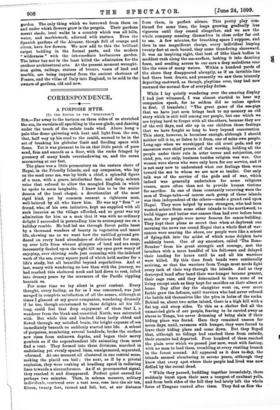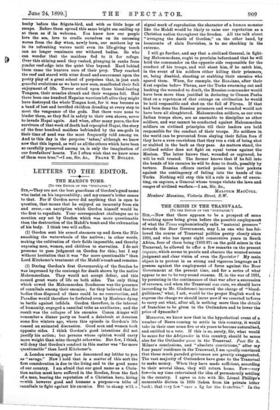CORRESPONDENCE.
A PORPOISE MYTH.
[To THE EDITOR OF THE " SPECTATOR:] SIR,—Far away to the horizon on three sides of us stretched the sea, its wavelets all sparkling in the sun-glade, and dancing under the touch of the sedate trade wind. Above hung a pale-blue dome quivering with heat and light from the sun, that, half way up his road to the zenith, seemed to be in the act of breaking his globular limit and flooding space with flame. Yet it was pleasant to lie on that little patch of pure sand, firm and smooth as a floor, with the rocks fringed by greenery of many kinds overshadowing us, and the ocean murmuring at our feet.
The place was a little promontory on the eastern shore of Hapai, in the Friendly Islands, and my companion, who lay on the sand near me, was by birth a chief, a splendid figure of a man, with a grave, intellectual face, and deep, solemn voice that refused to allow the mangled English in which he spoke to seem laughable. I knew him to be the senior deacon of the local chapel, a devotionalist of the most rigid kind, yet by common consent a righteous man, well-beloved by all who knew him. He was my " flem " or friend, who, of his own initiative, kept me supplied with all such luxuries as the village afforded, and so great was my admiration for him as a man that it was with no ordinary delight I succeeded in persuading him to accompany me on a holiday ramble. He had led me through forest paths beset by a thousand wonders of beauty in vegetation and insect life, showing me as we went how the unfilled ground pro- duced on every hand abundance of delicious food for man, up over hills from whence glimpses of land and sea scope incessantly flashed upon the sight till my eyes grew weary of enjoying, over skirting reefs just creaming with the indolent wash of the sea, every square yard of which held matter for a life's study, but all beautiful beyond superlatives. And at last, weary with wondering no less than with the journey, we had reached this sheltered nook and laid down to rest, lulled into dreamy peace by the murmurs of the Pacific rippling beneath us.
For some time we lay silent in great content. Every thought, every feeling, as far as I was concerned, was just merged in complete satisfaction of all the senses, although at times I glanced at my grave companion, wondering dreamily if he too, though accustomed to these delights all his life long, could feel that deep enjoyment of them that I, a wanderer from the bleak and unsettled North, was saturated with. But while this and kindred ideas lazily ebbed and flowed through my satisfied brain, the bright expanse of sea immediately beneath us suddenly started into life. A school of porpoises, numbering several hundreds, broke the surface new risen from unknown depths, and began their merry gambols as if the superabundant life animating them must find a vent. They formed into three divisions, marched in undulating yet evenly spaced lines, amalgamated, separated, -eformed. At one moment all clustered in one central mass, making the placid sea boil ; the next, as if by a pivotal explosion, they were rushing at headlong speed in radiating lines towards a circumference. As if at preconcerted signal, they reached it and disappeared. Perfect quiet ensued for perhaps two minutes. Then, in solemn measure, solitary individuals, scattered over a vast area, rose into the air ten, fifteen, twenty feet, turned and fell, but, at our distance from them, in perfect silence. This pretty play con- tinued for some time, the leaps growing gradually less vigorous until they ceased altogether, and we saw the whole company massing themselves in close order far out to sea. A few minutes, for breathing space I suppose, and then in one magnificent charge, every individual leaping twenty feet at each bound, they came thundering shoreward. It was an inspiring sight, that host of lithe black bodies in maddest rush along the sea-surface, lashing it into dazzling foam, and sending across to our ears a deep melodious roar like the voice of many waters. Within a hundred yards of the shore they disappeared abruptly, as if an invisible line had there been drawn, and presently we saw them leisurely departing eastward, as though, playtime over, they had now resumed the normal flow of everyday duties.
While I lay quietly wondering over the amazing display I had just witnessed, I was almost startled to hear my companion speak, for he seldom did so unless spoken to first. (I translate.) " The great game of the sea-pigs that we have just seen brings back to my memory an old story which is still told among our people, but one which we are trying hard to forget with all the others, because they are of the evil days, and stir up in our children those feelings that we have fought so long to bury beyond resurrection This story, however, is harmless enough, although I should neither tell it to, or listen to it from, one of mine own people. Long ago when we worshipped the old cruel gods, and my ancestors were chief priests of that worship, holding all the people under their rule in utter terror and subjection, our chief, yes, our only, business besides religion was war. Our women were slaves who were only born for our service, and it is not easy now to understand what our feelings then were toward the sex to whom we are now so tender. Oar only talk was of the service of the gods and of war, which indeed was generally undertaken for some religions reason, more often than not to provide human victims for sacrifice. In one of these constantly recurring wars the men of Tonga-tabus—of course each group of these islands was then independent of the others—made a grand raid uposs, Hapai. They were helped by some strangers, who had been washed ashore from some other islands to the northward, to build bigger and better war-canoes than had ever before been seen, for our people were never famous for canoe-building. They kept their plans so secret that when at daybreak one morning the news ran round Hapai that a whole fleet of war- canoes were nearing the shore, our people were like a school of flying-fish into the midst of which some dolphin have suddenly burst. One of my ancestors, called The Bone- Breaker' from his great strength and courage, met the invaders with a mere handful of his followers and delayed their landing for hours until he and all his warriors were killed. By this time fresh bands were continually arriving, so that the warriors from Tonga must needs fight every inch of their way through the islands. And as they destroyed band after band their war-hunger became greater, their rage rose, and they determined to leave none of us living except such as they kept for sacrifice on their altars at home. Day after day the slaughter went on, ever more feeble grew the defence, until warriors who had never refused the battle hid themselves like the peca in holes of the rocks. Behind us, about two miles inland, there is a high bill with a flat top and steep sides. To this as a shelter fled all the unmarried girls of our people, fearing to be carried away as slaves to Tonga, but never dreaming of being slain if their hiding place was found. Here they remained unseen for seven days, until, ravenous with hunger, they were forced to leave their hiding place and come down. But they Hoped that, although no tidings had reached them from outside, their enemies had departed. Four hundred of them reached the plain over which we passed just now, weak with fasting, with no man to lead them, trembling at every rustling branch in the forest around. All appeared as it does to-day, the islands seemed slumbering in serene peace, although they knew that every spot where their people had lived was now defiled by the recent dead.
" While they paused, huddling together irresolutely, there suddenly burst upon their ears a tempest of exultant yells, and from both sides of the hill they had lately left the whole force of Tonga.ns rushed after them. They tied as flies the
booby before the frigate-bird, and with as little hope of escape. Before them spread this same bright sea smiling up at them as if in welcome. You know how our people love the sea, love to cradle ourselves on its caressing waves from the day when, newly born, our mothers lay us in its refreshing waters until even its life-giving touch can no longer reanimate our withered bodies. So who can wonder that the maidens fled to it for refuge. Over this shining sand they rushed, plunging in ranks from yonder reef-edge into the quiet blue beyond. Hard behind them came the hunters sure of their prey. They reached the reef and stared with utter dread and amazement upon the pretty play of a great school of porpoises that, in just such graceful evolutions as we have now seen, manifested their full enjoyment of life. Terror seized upon those blood-lusting Tongans, their muscles shrank and their weapons fell. Had there been one hundred Hapaian warriors left alive they might have destroyed the whole Tongan host, for it was become as a band of lost and terrified children dreading at every step to meet the vengeance of the gods. But there were none to hinder them, so they fled in safety to their own shores, never to invade Hapai again. And when, after many years, the few survivors of that week of death had repeopled Hapai, the story of the four hundred maidens befriended by the sea-gods in their time of need was the most frequently told among us. And to this day is the porpoise ' taboo,' although we know now that this legend, as well as all the others which have been so carefully preserved among us, is only the imagination of our forefathers' hearts. Yet I often wish that we knew some of them were true."-4 am, Sir, &c., FRANK T. MILLEN.



















































 Previous page
Previous page